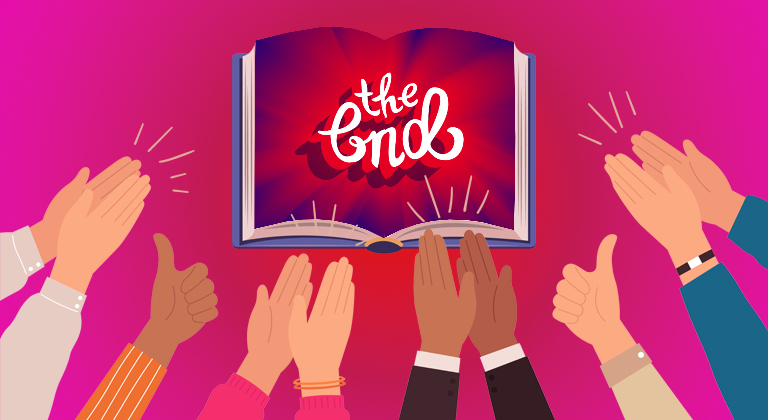The Importance of a Satisfying Ending
As writers, we spend countless hours crafting the beginnings and middles of our stories, ensuring every plot twist and character development hooks our readers. But what about the ending? The final act of your story is more than just the conclusion—it’s the culmination of every narrative thread, every character arc, and every emotional beat you’ve woven throughout your work. It’s what your readers will remember long after they’ve closed the book.
In today’s blog, Ginger demonstrates that while a well-crafted conclusion is a critical component of any successful story, getting it wrong can undermine the entire reading experience. Through a variety of examples, both successful and disappointing, he explains what goes into an ending that really resonates with readers. Understanding the importance of a satisfying conclusion can transform your storytelling, ensuring your readers are left with both a sense of fulfillment and a desire for more of your work.
By the time you read this blog post, the latest Star Wars series on Disney+, Star Wars: The Acolyte, will have reached a thrilling (or not) conclusion – and I think there’s a lot we can learn from how it ended.
The reception to this 7-episode series has been wild. Star Wars fans are known for being an opinionated bunch, and many fans on Twitter have been complaining that Star Wars has been “ruined” by Disney ever since the sequel trilogy concluded with The Rise of Skywalker.
However, it took Star Wars: The Acolyte to really stir things up to a fever-pitch – and now people are literally sending death threats to showrunner Leslye Headland and other advocates of the show, all because of how they believe the prequel series “ruined canon” and diminished the original movies.
However, all this online criticism has been stirred up before the series has even ended – leaving some people (well, me, at least) wondering if the complaints leveled against The Acolyte are valid, or if the final episode will actually address all these criticisms with a clever twist that none of us saw coming.
The jury is still out on that one – but it highlights an important point about storytelling: The ending of a story is sometimes the most important part of it.
Beginning with the End
A well-conceived ending can transform a challenging work of fiction into a sublime one. Conversely, a poor ending can destroy an otherwise engaging and well-written tale. The way you end a story is even more important than how you begin it – so much so that some top-selling authors like Freida McFadden are famous and popular precisely because of the reputation they’ve earned for writing books with satisfying twists to the tale.
But you’ve got to get it right. In the case of The Acolyte, showrunner Leslye Headland stirred up a hornet’s nest by including a legacy character from the prequel movies, Jedi Master Ki-Adi-Mundi. In the 1999 prequel movie The Phantom Menace, Ki-Adi-Mundi dismisses the notion that a Sith Lord is at large, claiming: “The Sith have been extinct for a millennium.”
However, a Sith-like villain is the antagonist of The Acolyte, which is set nearly a century earlier than The Phantom Menace – so many fans are confused at how Ki-Adi-Mundi can claim the Sith have been extinct for a thousand years in the later movie if this series retroactively places him face-to-face with one just a century earlier.
The answer is, of course, that we don’t know why Ki-Adi-Mundi makes this claim given the events of The Acolyte, but I’m pretty sure the final episode will answer that question. The decision to include this legacy character must have been a deliberate decision by the writing team, so it seems inconceivable that they’d do so without addressing how his presence seemingly invalidates one of the few lines of dialogue the character actually had in the prequel movies.
My belief is that the final episode will explain the contradiction – and in doing so, perhaps totally invalidate what fans were getting so irate about it in the first place! (I’ll let you know when I see it!)
And that demonstrates the potential power of a good ending (and why it’s important to actually get to the ending of a story before getting upset about it!)
The Acolyte also highlights how an ending has the potential to totally transform a story – subverting expectations, wrapping up loose ends, and delivering a dopamine-packed punch to the audience that keeps the story alive in their minds long after they’ve finished enjoying it.
Inspired by The Acolyte, I’m going to give some examples of books that got endings right (and some that got endings wrong) and talk about how crafting a clever conclusion should be one of the most important things to focus on when writing your next book.
All Roads Lead to the Ending
As a self-published author, you know that every element of your story should be crafted with care. From the initial hook to the development of characters and plot, every component plays a vital role in engaging your readers. That’s why I advocate for using systems like Dan Harmon’s Story Circle to help frame a story correctly.
And out of all the points in a Story Circle, one of the most critical is the ending. It can make or break your book’s success, no doubt about it. A satisfying conclusion not only leaves a lasting impression on your readers but also ensures they’ll come back for more of your work.
The Importance of a Satisfying Ending
An ending serves as the final punctuation of your story. It’s the culmination of your narrative arc, and should provide a satisfying resolution to the journeys your characters have been on.
But an ending is more than that. It’s also the last taste left in the reader’s mouth after they devour your book, and as a result it can heavily influence their overall impression of your story. A well-crafted ending can transform a good tale into an unforgettable one, while a poorly executed ending can leave readers feeling frustrated, disappointed, and unlikely to read your books again.
(WARNING: Various spoilers ahead!)
Here are some examples of famously unsatisfying endings in fiction:
- Breaking Dawn by Stephenie Meyer: I’m not going to lie. I secretly stan for Stephanie Meyer. For all the criticisms leveled at The Twilight saga, the books undeniably resonated with millions of fans and deserved the success they achieved. However, many readers felt let down by the final book in the Twilight saga, Breaking Dawn. In the climax of the series, the slow-burning buildup to the confrontation between the Cullen family and the Volturi initially seemed to climax in a bloody battle that ended the lives of many of our favorite characters. It was abrupt, shocking, and totally unexpected. However, it was also entirely made up. The bloody battle was merely a vision forced into the Volturi’s head by Alice Cullen. Shown the potential consequences of fighting, the Volturi eventually ended their dispute with the Cullen family through diplomatic resolution rather than conflict. It was a clever twist, but the fake-out battle and the anti-climactic ending left many fans feeling cheated out of the showdown they’d all been eagerly anticipating.
- The Dark Tower by Stephen King: Stephen King is a master storyteller, but he’s also known for writing unsatisfying endings. He’s so famous for it that there’s even a reference in the latest movie adaptation of his famous book, It! I’ve always been aware of his reputation for writing bad endings, but I’d never really felt short-changed by King’s storytelling until I read the conclusion of The Dark Tower series. After a long and complex journey, gunslinger Roland finds himself right back at the beginning of his quest, suggesting the whole series of books is just one part of an endless cycle. While I could understand why that is a “clever” ending thematically, I found it frustrating and unsatisfying and wish I’d followed King’s own warning not to read that final chapter!
- Requiem by Lauren Oliver: Lauren Oliver’s Delirium trilogy has won legions of fans, but many of them have commented that they felt unsatisfied by the open-ended conclusion of the final book. The fate of the characters and the resolution of the dystopian conflict were left ambiguous, which left some critics complaining that the whole trilogy felt unfinished. From a personal perspective, I found it frustrating to have followed Hanna for so much of Requiem, only to be left with little idea of what happened to her after the climactic battle of Portland. Even a short epilogue would have provided some much-needed closure.
Examples of satisfying endings:
- Harry Potter and the Deathly Hallows by J.K. Rowling: Although Rowling is a very controversial figure these days, few can argue that she writes a damned good story. The conclusion of the Harry Potter series is a great example, and almost a perfect antidote to a trilogy like Lauren Oliver’s Delirium. At the end of the final book, Rowling ties up loose ends with almost pathological completeness – resolving the central conflict with an epic battle, and then providing a rich view into the future lives of the main characters far into their future. The epilogue shows the characters “all grown up” and sending their own children to Hogwarts, and it offers a satisfying sense of closure and a warm hope for the future of the school.
- The Lord of the Rings: The Return of the King by J.R.R. Tolkien: Tolkien’s epic conclusion to his iconic fantasy trilogy is celebrated for how thorough and satisfying it is. Of course, the destruction of the One Ring and the fall of Sauron bring peace to Middle Earth – but we also enjoy seeing how many various character arcs wrap up, such as Frodo’s departure to the Undying Lands and Aragorn’s ascension to the throne. Tolkien is nothing if not a completist, and the ending of his trilogy feels both thorough and emotionally fulfilling.
- To Kill a Mockingbird by Harper Lee: I’ve often remarked that Harper Lee was the only author to become famous for a single novel, and part of the reason for that is the ending. The resolution of the trial at the end of To Kill a Mockingbird, and the lessons learned by Scout Finch about morality, empathy, and justice, provide a rich sense of closure that reinforces the novel’s themes and leaves us feeling changed for having read it.
Tips for Crafting a Satisfying Ending
Okay, so I’ve outlined the importance of writing a good conclusion to your story. Now, let’s talk about how to do it. Crafting a satisfying ending requires careful planning and a deep understanding of both your story and the characters who live in it. Here are some tips you might find useful.
- Resolve Major Plot Points: While some authors love cliffhangers, you’ve got to end a story eventually – so even if it’s only in the final book of your series, ensure that all the central conflicts and major plot points are resolved. Loose ends need to be tied up to provide a sense of closure and to ensure that readers feel like their investment in your story has paid off.
- Stay True to Your Characters: Your characters should act in ways that are consistent with their development throughout the story. An ending which hinges on a protagonist suddenly acting out of character will be jarring and unsatisfying, and feel like something of a betrayal to the readers who’ve stuck things out until the end.
- Balance Predictability and Surprise: More than 2,000 years before self-publishing was invented, the philosopher Aristotle advised: “a good ending must be unexpected yet inevitable.” That advice remains just as valid today. A well-written story should have a conclusion that strikes the balance between satisfying and surprising. Avoid overly predictable conclusions, but also ensure that the resolution feels earned and logical within the context of the story.
- Emotional Impact: Storytelling, at its core, is the craft of inspiring one emotion in the audience, then taking them on the journey toward feeling another emotion. A well-written ending is the ideal way to achieve that. Aim for an ending that elicits strong emotions from your readers – whether that’s joy, sadness, relief, or reflection. A powerful emotional response can leave a lasting impression, and help ensure your story remains within a reader’s mind long after they’ve turned the final page.
- Thematic Consistency: Theme is an important, but often overlooked part of a good story, so when you’re writing your ending, try to make sure that it reinforces the themes and messages you were trying to convey. A satisfying ending that aligns with the overall themes of your story can elevate the narrative and give your writing an even greater sense of coherence and purpose.
- Consider Future Implications: Happily-ever-after requires a glimpse into the future of your characters and world – otherwise how will the reader know that it’s “ever after?” Therefore, be sure to include details in the conclusion of your story that provide a sense of continuity and give readers a satisfying sense of what comes next for your main characters, even if the story itself has finished.
- Test with Beta Readers: A seasoned writer can have a pretty good idea of what constitutes a satisfying ending, but it never hurts to get another opinion. If you can, share your ending with beta readers and seek feedback. Their reactions can provide valuable insights into whether your conclusion is as satisfying and impactful as you think it will be.
- Revisions and Refinements: And if your beta readers come back with criticisms, don’t despite. You should never be afraid to revise your ending, sometimes even multiple times. A strong conclusion often requires fine-tuning and adjustments to get it just right – but the impact it’ll have on your readers will make the extra work worthwhile.
- Avoid Deus Ex Machina: Steer clear of sudden, unexplained resolutions that feel like a cheat. Your ending should arise naturally from the story and characters, rather than relying on a convenient plot device. Even though I’ve just praised it for its ending, the conclusion of the Lord of the Rings contains an example of this – when the eagles appear and rescue the Hobbits from the peak of Mount Doom. It’s a jarringly convenient way to get Frodo and Sam back to the Shire, and feels out-of-place with the rest of the saga.
- Take Your Time: Finally, remember that writing a great ending takes time and effort. Don’t rush the process. Allow yourself the space to craft a conclusion that truly does justice to your story. After all, your final words will be the ones your readers remember best.
Conclusion
As a self-published author, the ending of your story is your final and most important opportunity to leave a lasting impression on your readers. A satisfying conclusion can elevate your book from good to great, ensuring that your readers will remember your work and eagerly anticipate your future releases. By resolving major plot points, staying true to your characters, and eliciting strong emotions, you can create an ending that resonates with your audience and concludes on a high note – leaving your readers with an immensely satisfying sense of fulfillment.
But you’ve got to get it right! As Star Wars: The Acolyte demonstrates, your audience will have certain expectations for your story, and if you take risks with that narrative (like how The Acolyte introduces a legacy Star Wars character and has him directly contradict a statement he makes later) you’d better make that risk pay off in a way that your audience finds satisfying – otherwise you’ll hear about it!
But don’t let that intimidate you. As a storyteller, you wield tremendous power to craft compelling narratives that take readers on a wild and engaging journey. Now that you understand the importance of a cleverly conceived and satisfying ending, you can make sure that journey ends at a suitable destination.












The opening paragraph sells the story. The ending paragraph sells the next one.